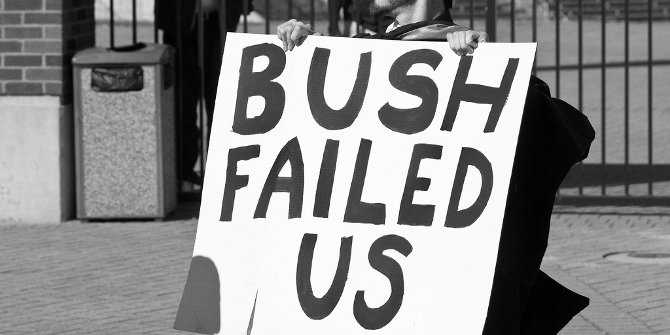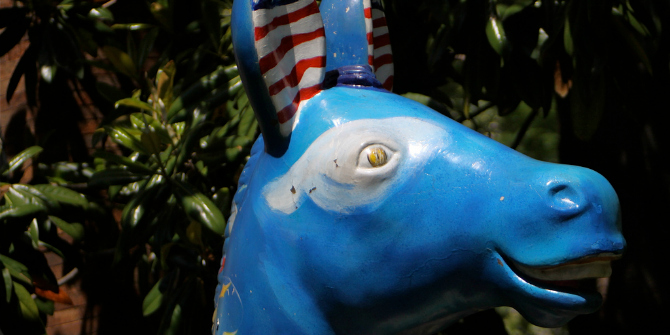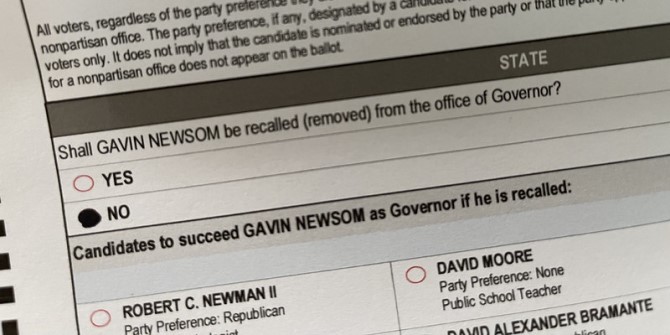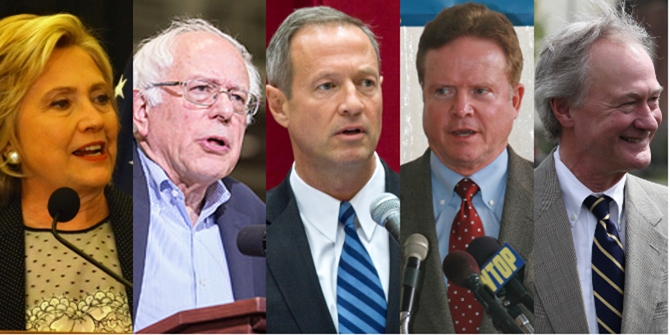 More than seven years after he left office, George W. Bush is back in the news after being attacked by Donald trump over his responsibility for the 9/11 terrorist attacks and the 2003 Iraq War. Peter Harris writes that Trump’s attacks follow a rehabilitation of sorts of George W. Bush’s reputation – at least among Republicans. He argues that the fight over Bush’s legacy is a microcosm of the broader struggle now taking place within the Republican Party which pits moderates – who are embracing Bush’s legacy – and anti-establishment Republicans like Trump who want to move on from what they see as the failed politics of the past.
More than seven years after he left office, George W. Bush is back in the news after being attacked by Donald trump over his responsibility for the 9/11 terrorist attacks and the 2003 Iraq War. Peter Harris writes that Trump’s attacks follow a rehabilitation of sorts of George W. Bush’s reputation – at least among Republicans. He argues that the fight over Bush’s legacy is a microcosm of the broader struggle now taking place within the Republican Party which pits moderates – who are embracing Bush’s legacy – and anti-establishment Republicans like Trump who want to move on from what they see as the failed politics of the past.
George W. Bush is back in the spotlight. For most of the past seven years, the 43rd president has shunned making interventions in US politics. But having now been drafted onto the frontlines of brother Jeb’s campaign for the White House, and after coming under intense criticism from Donald Trump over the 9/11 terrorist attacks and the 2003 invasion of Iraq, Bush’s legacy has become one of the hot topics of the moment.
In Britain, Bush tends to be remembered with a mix of disgust and derision, alternately portrayed as hubristic warmonger and bumbling idiot. But in America, Bush’s stock is rising. The former president boasts a higher approval rating than both Barack Obama and presidential hopeful Hillary Clinton, for example, and it is quickly becoming conventional wisdom that George is one of Jeb’s best assets.
Unsurprisingly, the Bush revival is being felt most acutely inside the Republican fold. One poll last year found that 80 percent of Republican voters still approve of Dubya’s tenure as president. Senator Lindsay Graham was hardly alone, then, when he confided aloud in December: “I miss George W. Bush. I wish he were president right now!”
It was always predictable that assessments of Bush’s would improve after he left office. Simply put, he was so unpopular when departing the White House that there was little room for opinions of him to worsen. According to Gallup, Bush’s approval rating fell to just 25 percent towards the end of 2008, helping drag his second-term average down to a meager 37 percent. With three quarters of Americans disapproving of his leadership, things really could only get better for Bush.
Credit: Ian Aberle (Flickr, CC-BY-SA-2.0)
Back then, the principal causes of Bush’s unpopularity were the Iraq War, which most Americans judged to be a mistake from mid-2005 onwards, and his controversial response to the financial meltdown of 2007-2008. During the 2008 election, with the economy tanking, Bush was so badly regarded by electors that John McCain wisely shunned the president on the campaign trail.
Always anathema with liberal Democrats, Bush’s decision to bail out Wall Street made him toxic even among conservative Republicans. The Trouble Asset Relief Program (TARP) authorized around $700 billion of government spending and was instrumental in giving rise to the Tea Party movement, whose members accused Bush and his supporters of having ditched conservative principles in favor of “big government” solutions to economic problems. For much of the past eight years, it has been this anti-Bush wing of the GOP that has seemed ascendant.
At some point, these uncompromising assessments of Bush were bound to soften—if not among Democrats, then surely among those conservatives who had supported Bush in 2000 and 2004. But the precise way in which the Bush legacy is now being debated by Republicans is telling.
Some Republicans, it seems, have fond memories of Bush’s decisiveness and his toughness, and believe that reminding voters of these qualities will help to paint a favorable contrast between their party and the Democratic Party of Barack Obama and Hillary Clinton. When President Obama backed away from attacking the Bashar al-Assad regime in September 2013, for example, it might have been quipped that at least President Bush had been able to make the wars run on time.
But it is not just Bush’s hawkishness that is coming in for appreciation. His defense of Muslim Americans and particularly his show of solidarity with them after the 9/11 terrorist attacks is now widely being portrayed as a moment of great political leadership—bravery, even. Relative moderates within the GOP are using Bush’s record of statesmanship to underscore just how ugly and divisive is the rhetoric coming from some Republican candidates today, especially Trump.
Incredibly, then, Bush is now being remembered as something of a centrist within his party, in the same vein as his father and brother. This would have been difficult to imagine at the height of Bush’s presidency, when he was regarded as a hardline conservative, especially on social issues—a president who did an awful lot to polarize the country. It says a lot about the current Republican crop that, in contrast to them, George W. Bush is a paragon of virtue.
The passage of time cuts both ways, however, when it comes to assessments of Bush. Donald Trump, for example, has not been shy of pointing out that the 9/11 attacks happened on Bush’s watch, the not-so-subtle implication being that responsibility for the attack rests, at least in part, with the president himself. More recently, Trump has accused the Bush administration of lying over Iraq’s alleged stockpiles of weapons of mass destruction.
Of course, Trump is only stating the obvious when he says that 9/11 occurred on Bush’s watch and that Saddam Hussein turned out to have no meaningful WMD capabilities. And he is not the first Republican to question the wisdom of neo-conservative foreign policies. But insinuating that President Bush was to blame for 9/11 and that he lied over Iraq are accusations of an entirely different order of magnitude, and would have been unthinkable for a budding Republican presidential nominee just eight months ago.
The battle lines suggest that the fight over Bush’s legacy is a microcosm of the broader struggle taking place inside the Republican Party. For mainstream Republicans, Dubya has become an unlikely standard-bearer for moderation. A myth is starting to emerge that presents Bush as strong, confident and decisive yet also sober, fair-minded and responsible. This is the kind of president that can make America great again, the GOP establishment is trying to impress upon recalcitrant primary-voters.
But Bush symbolizes something completely different (even if just as useful) for anti-establishment Republicans like Trump. To them, Bush represents the failed politics of “business as usual.” Bush’s failures—Iraq, the Wall Street bailout—are fresh in the minds of many voters, making them vivid illustrations of what happens when the political class is allowed to govern unchecked.
It is over Bush-era national security policies that the two sides clash most visibly and most violently. For the establishment, it is an article of faith that George W. Bush “kept America safe.” It is nothing sort of traitorous to suggest otherwise. But for Trump, the debate over Bush’s legacy offers a unique and unmissable opportunity to brandish his total irreverence and utter contempt for sacred cows—a message that plays very well with “his” slice of the GOP electorate.
The overwhelming majority of Republicans reject Trump’s slurs against Bush, just as they reject his broader populist message. But Trump doesn’t need to be universally popular. He knows that winning elections is about getting enough votes in enough places. Vilifying Bush might just help him do that.
Please read our comments policy before commenting.
Note: This article gives the views of the author, and not the position of USApp– American Politics and Policy, nor of the London School of Economics.
Shortened URL for this post: http://bit.ly/1LwLchO
_________________________________________
About the author
 Peter Harris – Colorado State University
Peter Harris – Colorado State University
Peter Harris is an assistant professor of political science at Colorado State University, where he teaches classes on international security, US foreign policy and International Relations theory. He received his Ph.D. in Government from the University of Texas at Austin, where he was also a graduate fellow of the Clements Center for History, Strategy and Statecraft.







